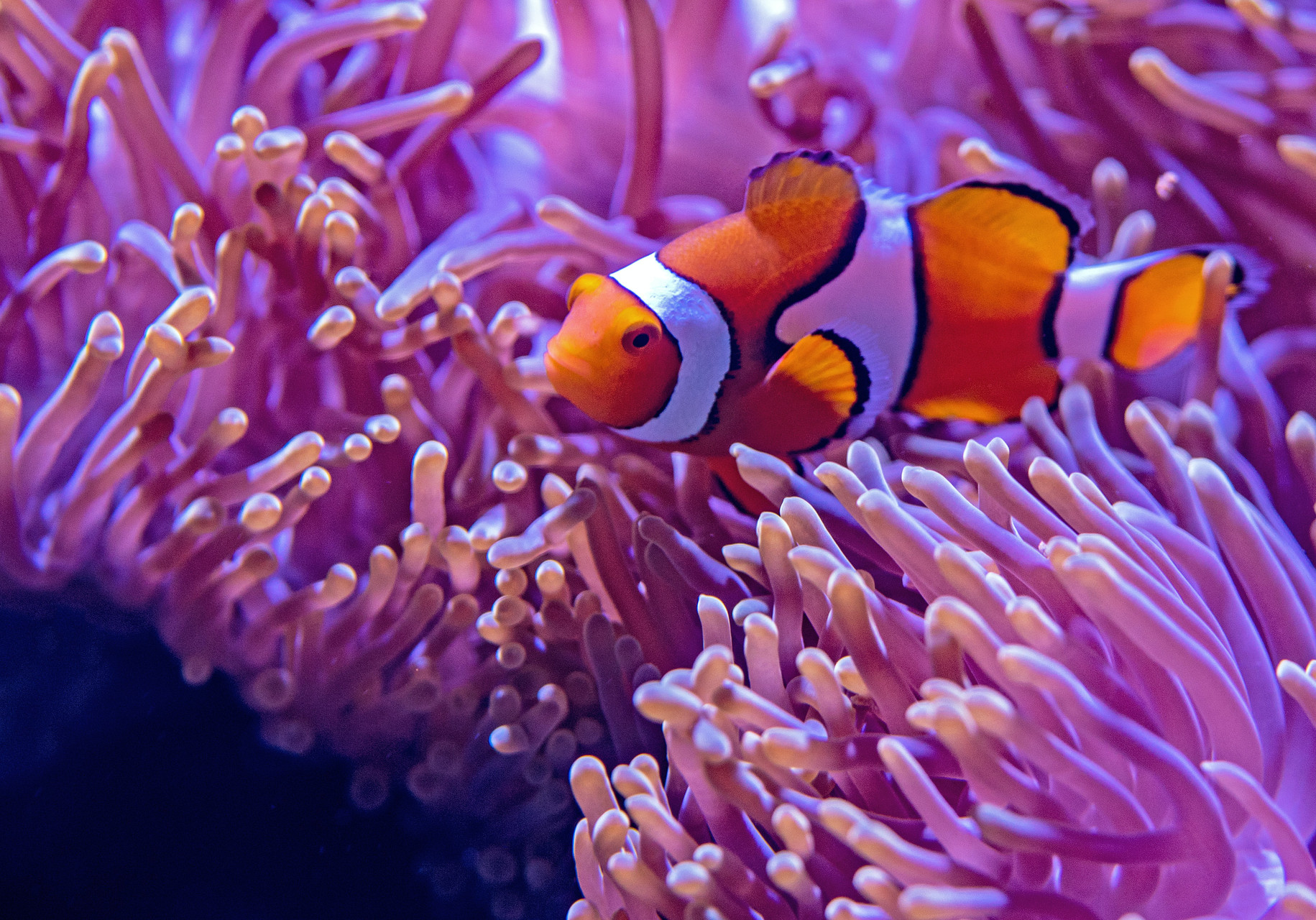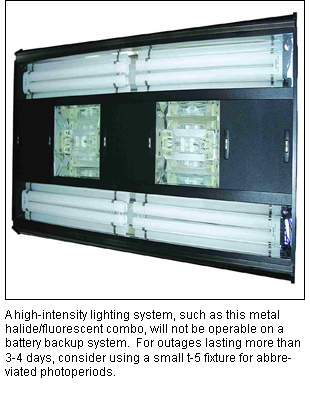Tips From the Pros: Prepping for Power Outages


The Scene:
One of the undisputed keys to successfully keeping saltwater aquaria is preparation. In most cases, this boils down to stuff like keeping extra fresh and saltwater on hand with which to do emergency water changes, or ordering extra light bulbs before the old ones burn out. Little things like these undoubtedly help us maintain the stable conditions needed by our livestock. However, there is one kind of emergency situation which requires quick action, and being prepared for it can mean the difference between life and death in your tank. I am referring to power outages, and I know many aquarists live in fear of this eventually. There are many areas of the country which routinely experience power outages, and when they are measured in hours or days they can lead to grave results. Being prepared to contend with a short or long term power outages takes vastly different preparations, but thinking ahead of time about what you would do in either case is as important as what you do do when your hand is forced. In other words, you may not rush out and set up an auxiliary power system for your aquarium today, but thinking about it today will give the reactionary edge when it comes time to deal with an impending disaster. If you know what to do, you can have a long lasting solution to the problem in no more time than what it takes to purchase a few commonly available items and plug them together.
Minor and Major Outages:

In minor occurrences, where the outage lasts only a few minutes to an hour, there is little to fear from adverse temperatures or oxygen levels (unless the tank is overstocked with fish). Often, such events are the result of a cord being unplugged accidentally, a blown circuit breaker, or the switch on an outlet strip being turned off. These problems are easily remedied and certain preventative measures can be taken as well. If possible, keeping the lights on their own circuit is best. Doing so ensures the lights, which generally draw the most electricity, cannot overload the circuit that also contains the life support systems. If you run a chiller as well, you will want to consider a similar course of action. There are also alarms available that go off when power to the circuit is interrupted. These devices are typically plugged in at the outlet, between it and the other electrical equipment. If you happen to be lucky enough to be home when the alarm sounds, you will be able to problem solve immediately. You can further enhance your chances by using an Uninterrupted Power Supply (UPS), which is essentially an outlet strip with a battery backup. If your most vital equipment like pumps and heaters are plugged in to the UPS, you can buy yourself some precious time. UPS units come in variable sizes, allowing you to choose the battery life with which you are comfortable. Beyond this, it is probably a good idea to keep a few battery powered air pumps on hand. Even the small amount of water movement provided by these can be enough to save the day during a minor outage.
In contrast to minor events, major power outages are highly hazardous to livestock. They may take days to resolve, and the steps taken during a minor event will simply not suffice when the stakes become this high. Just last year there was a 72 hour outage at my house that cost me several specimens. I live in California where we rarely have extreme weather events and prolonged power outages, and I was foolish to assume that I was insulated from this fate. Alas, I was wrongbut I learned a valuable lesson. The love, time, effort, and money that go into a saltwater tank are incalculable. It is more than worth the few hundred dollars it takes to invest in a backup power supply that can handle your systems demands for days or more.

The Backup Plan:
To create an effective auxiliary power system, you have a number of options. The most obvious consideration is the power source. Generators come in a number of forms, and many folks that live in areas of extreme weather, especially cold, are probably intimately familiar with them. A generator is basically ideal, but also impractical or impossible for many to have and use. You may instead consider a 12 V power source. These are basically batteries that include a built-in inverter, which switches the electricity from Direct Current (DC; the kind batteries produce) to Alternating Current (AC; the kind that comes from the wall). The problem with 12 V power sources is that they have a limited capacity for battery life and peak output. They also have to be re-charged frequently.
A better option uses the principle of the 12 V power source, but combines it with a more powerful battery. Marine deep cycle batteries are designed to produce power for long durations. Combine one with a powerful inverter and you will certainly be able to power a couple of small water and air pumps for many days. You can also hook them up to solar trickle chargers, which will keep them fresh for much longer. You may even be able to run a reduced light cycle off the same battery, but this step is really only necessary if the outage closes in on a week in length.
To save on battery life, you can opt to run a larger pump for shorter time periods. Small bilge and live well pumps are available at boating stores, and these can be wired directly to a battery with an inline fuse. Such pumps range from 300 to 2000 gallons per hours, but most are still small enough to fit into a regular sump tank. If run once or twice an hour forsayfive to ten minutes at a time, adequate turnover should be achieved. Combine this process with a few small air pumps running constantly, and you should get good battery life and enough water movement to keep your livestock alive for more than long enough to outlast the power outage. The idea is really to nurse the tank through the issue by running a skeletal life support system until normal power has returned.
Temperature control is an underrated aspect of the emergency power outage situation, in both directions. It probably goes without saying, but extremes of temperature either way can both lead to prolonged power outages. The biggest challenge is overcoming the amount of energy it requires to change the temperature of water. Because of its high heat capacity, tank water will tend to stay stable at first, but once it slips from its optimal range the momentum can be hard to arrest. Cold and heat each pose unique threats, but both can be combated initially with insulation. I like to wrap blankets, jackets, and foam pads around the sides of the tank, securing them with rope or string. Doing so will help to maintain the temperature differential between the tank water and the ambient environment. An aquarium heater can be incorporated into the skeletal life support system that runs off the deep cycle battery, but there will certainly be a limit to the size of heater the battery will maintain. On the other hand, a heat wave may even be worse. A chiller will simply draw too much power to be run off of a normal 12 V battery, and it may be necessary to float bags of ice inside the tank to keep it cool. An alternative option is to use packing tape to secure one-gallon sealable bags of ice to the sides of the tank, and fix the insulative materials around them. Of course, the bags will need to be refreshed often, and the tank temperature monitored closely to keep it in a good range.

Final Thoughts:
The idea behind this article was not necessarily to tell you how to create an auxiliary power system for your tanks life support components; it was written more with the intent to make you start thinking ahead about what you will do the next time the power goes out at your house. And it will go out; power outages are as ubiquitous of an issue for aquarists as Aiptasia anemones and hair algae. We all go through it. Having a strategy in place for dealing with this type of emergency is paramount in preventing a costly (and heartbreaking) disaster. It is sort of like planning the fire escape route for your home or place of employment. What you need to do should be plainly obvious in your mind, even if you never have the need to use the plan. In fact, I sincerely hope you never do. Unfortunately, I know all too well that luck is simply the name we give to unplanned or unexpected events. Do not leave this to luck, your livestock depends on it.